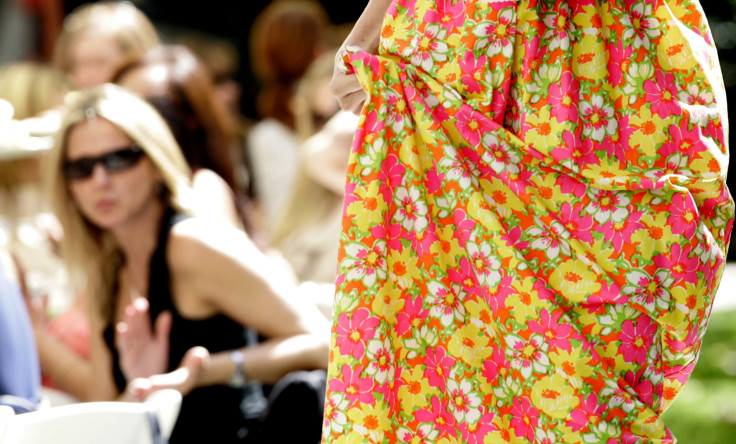What Is 'Thinspo?' Lilly Pulitzer Fat-Shaming Cartoon Could Have Been 'Thinspiration'

Preppy fashion line Lilly Pulitzer got some unexpected bad press on Tuesday when New York Magazine visited their New York City headquarters and posted a photo of hand-drawn "fat-shaming" cartoons an employee had pinned up near her desk.
pics of Lilly Pulitzer offices but LP staff forgot to take down fat-shaming cartoons on fridge http://t.co/FnV9ldp4aY pic.twitter.com/o4FcSSrhsa
- Caro (@socarolinesays) May 26, 2015Naturally, the image went viral and the Internet went Defcon 5 in angry righteousness. Although the images are unmistakably "fat shaming," it's entirely possible the images were meant to shame their creator. The Web is full of what many young women battling eating disorders call "thinspo" or "thinspiration," i.e., pictures of very thin -- or overweight -- women used to remind them of why they're dieting.
One cartoon of an overweight woman in a bikini was captioned, "Put it down, carb face." Another unflattering cartoon featured a drawing of a woman in jeans and a tank top, with the caption: "Just another day of fat, white and hideous… You should probably just kill yourself.” Not exactly the message the brand probably wants broadcast, although it's already in hot water for selling plus-size versions of its clothes in collaboration with Target only online.
These shocking cartoon drawings and messages that either no one in the office had ever noticed or, worse, ever cared about, seem to belong to the genre of "thinspiration" blogs and so-called pro ana (pro anorexia) websites, dark corners of the Internet where women who have internalized society's obsession with thinness go to reinforce its punishing message.
I won't stop talking about how horrific this is, @LillyPulitzer. Explain why you cultivate a culture of hate. https://t.co/XkzQYJ1A5s
- Sarah Conley (@styleit) May 26, 2015I always knew not to trust lily pulitzer. The stepford wives of floral
— Arabelle Sicardi (@arabellesicardi) May 26, 2015Usually, the "thinspiration" or "thinspo" blogs feature images of thin women in bikinis. In extreme cases, on the "pro ana" sites, there are images of skeletal women who look sick. But sometimes these sites feature "reverse triggers," or "often near-pornographic images of large women" as Mebbie Bell describes it in an essay in "Embodied Politics in Visual Autobiography" (University of Toronto Press, 2014).
In Bell's essay, she describes a "reverse trigger" image on a pro ana site of a large woman in her underwear lying on a sofa, captioned (unkindly, not unlike the Lilly Pulitzer office cartoon), "Couch surfing like a beached whale." Bell quotes the pro ana site blogger explaining the reason she posted the "reverse trigger" image:
"[T]hese images represent what we never want to become. If you want to know why…just look around you at how these people too often end up being treated. Perhaps you yourself have been guilty of this at times. For the record, this site does not condone bashing fat people. We just choose not to be among their number, is all.”
For Dr. Alexis Conason, a New York City-based clinical psychologist who specializes in body image and disordered eating, this kind of thinking is all too common.
"There's an epidemic of women who hate their bodies," Conason told International Business Times. "Whether it involves body-shaming or 'thinspiration,' there's this idea in our culture that if we punish ourselves or berate ourselves, that it will lead to change and morph us into the body we want. And that if we fit into cultural ideals of thinness, our lives will be different."
Conason said that although we don't know what's going on for this particular person who drew the cartoons, oftentimes people who "bully" others or themselves have problems.
"It's not that the person is bad -- they're in pain and trying to come to terms with their own body. It gets internalized or projected onto others. When we see a child bullying, for example, that child is struggling," Conason said.
In response to the Internet uproar around the images, Lilly Pulitzer’s Vice President of Creative Communications Jane Schoenborn issued a statement: “These illustrations were the work of one individual and were posted in her personal work area. While we are an employer that does encourage people to decorate their own space, we are a female-dominated company and these images do not reflect our values. We apologize for any harm this may have caused.”
In the case of the woman who decorated her work space with "thinspo" messages, the damage may have already been done.
© Copyright IBTimes 2024. All rights reserved.






















